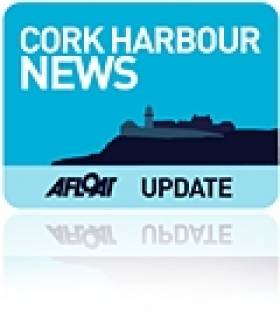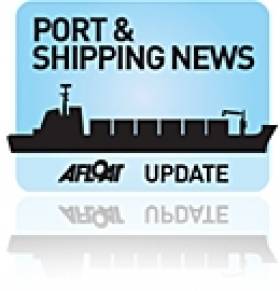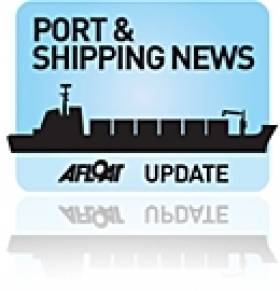Displaying items by tag: US Training Ship
#TrainingShip – Veteran US merchant training ship T.S. Empire State (1962/14,557grt) arrived into Cork Harbour this morning, the Irish port forming one of several European ports of call as part of an annual Summer Sea Term, writes Jehan Ashmore.
The former general cargo vessel crossed the Atlantic Ocean, where around 500 male and female cadets from the Maritime College of the State University College of New York (SUNY) will get hands-on experience to learn seafaring skills to compliment their classroom based studies.
This year's Summer Sea Term involves calls to ports in U.S. East coast ports, Portugal, Canary Islands and Denmark. The voyage will provide an opportunity to visit Western Europe and exposure to cultures overseas.
The cadets at SUNY Maritime enroll for four-years at the college which offers undergraduate and graduate degrees.
Launched in 1961, the Empire State was laid down originally as the general cargos ship SS Oregon at Newport News Shipbuilding and Drydock Company in Virginia. Her career began with States Steamship Company for service in the Pacific trades.
In design terms, her era is reflected through her classic hull form lines, cargo derricks and large superstructure compared to her modern container counterparts.
For further details of the ships interim career prior to her current role in which she has served since 1990, click this Link.
Empire State is no stranger to Irish ports as last year's Sea Term included Dublin Port. Her arrival today to Cobh, where the majority of cruise ships berth will provide something different for onlookers to witness.
Ports & Shipping Review: Port Sector Meeting, Maersk Join Rivals,Asia-Europe Trade Up, US Training Ship and Newbuild High
#ShippingReview: Over the last fortnight Jehan Ashmore has reported from the shipping scene where European port representatives and trade unions met for the first Sectorial Social Dialogue Committee for the Port Sector.
AP Moeller-Maersk A/S the World's largest container line, said it will pool vessels with its two biggest rivals in an effort to manage overcapacity and raise unprofitable freight rates.
Volumes from Asia to Europe grew just 0.1% in the first four months of the year to 4.4m TEU, according to the latest figures from Container Trades Statistics. This growth was mainly fuelled by an up-lift in Asia to Mediterranean services, with volumes declining from Asia to north Europe.
US training ship T.S. Empire State (1962/14,557grt) made a visit to Dublin Port having crossed the Atlantic Ocean. The veteran vessel, a former general cargo ship dates back to the era before containerisation.
Orders for newbuildings reached a two year high, with 222 ships of over 15m dwt in May, a level not seen since May 2011.
US Training Ship to Visit Dublin Port
#TrainingShip – The veteran US training ship T.S. Empire State (1962/14,557grt) arrived into Dublin Bay yesterday having crossed the Atlantic Ocean, she is however not due to dock in Dublin Port until tomorrow, writes Jehan Ashmore.
Operated by the SUNY Maritime College, University of New York, the 565-foot Empire State provides an essential component of the maritime experience for trainee cadets during the annual Summer Sea Term.
Cadets travel across the world learning about the hands-on operations of the ship which complements classroom studies while gaining exposure to international cultures.
This year's Summer Sea Term calls to ports in the U.S Gulf Coast, Canada, Ireland, Italy and Malta.
The cadets at SUNY Maritime enroll for four-years at the college which offers undergraduate and graduate degrees. As well as the summer training-ship cruises, there are 20 varsity athletic teams, five ROTC options, US Coast Guard license and intern programs.
Empire State was laid down originally as the general cargos ship SS Oregon at Newport News Shipbuilding and Drydock Company in Virginia and launched in 1961. Her career began with States Steamship Company for service in the Pacific trades.
Note the vessel's design of a different era as expressed through her classic hull form, fitting of cargo derricks and large superstructure compared to her modern container counterparts. For further details of the ships interim career prior to her current role in which she has served since 1990 click this Link.































































